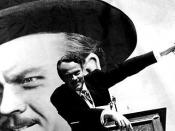In the classic film Citizen Kane, director Orson Welles introduces the idea of the American Dream: a life of success and wealth. One's formal expectation of this theme would be that of a perfect family life, large amounts of money, a successful career and ultimately, happiness. Welles redefined these expectations through the mise-en-scene of the first flashback in which Kane's parents bequeath him to Thatcher.
The scene opens with Charles Kane's mother, father and their banker, Thatcher, in the Kane boarding house. Kane's mother is shown in the forefront of the scene, walking towards the camera with the two men following in the background. This is representative of the control Kane's mother holds over the rest of the family, which is soon confirmed by her decision to give Charles to Thatcher despite the reluctance of both young Charles and his father. The scene then progresses to the three adults discussing the fate of Charles Kane. In this segment, Mrs. Kane and Thatcher are seated at the table while Mr. Kane stands slightly in the background. This shows Mr. Kane's lack of dominance and his frustration due to this fact. As the scene advances, the camera moves backward for a deep focus shot. This shot includes Kane's mother in the foreground, Kane's father at the door, and Kane himself in the background, seen only through the window. The audience's attention transfers back and forth between Kane's mother signing the papers and the outside window, where Kane is running around and throwing snowballs. This emphasizes how Kane's mother is signing the control of her son's life away. Later in the scene, the camera zooms in on Mrs. Kane's face for a close-up that shows the audience the complete lack of emotion Mrs. Kane has for giving up her son.


